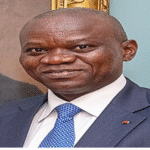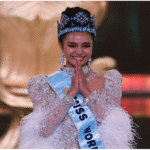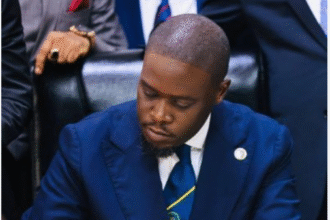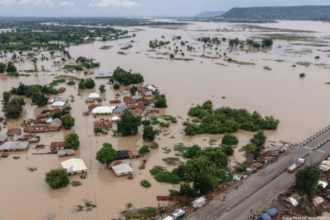By Lamin Guèye
Conakry, Guinea – Hopes for a free and fair democratic election in Guinea are fading amidst reports that junta leader and interim president, Mamady Doumbouya, is secretly forming a political party to run for president. This development throws into question the commitment to a genuine transition to civilian rule following the 2021 coup d’état that brought Doumbouya to power.
Doumbouya, who led the ouster of former President Alpha Condé on September 5, 2021, justified the coup by citing rampant corruption, the instrumentalization of the judiciary, and a disregard for democratic principles. Declaring the dissolution of the government and constitution, he promised a period of reform and reconciliation, even drawing inspiration from Rwandan President Paul Kagame, whom he met shortly after seizing power.
However, Doumbouya’s actions since taking control have painted a different picture. Critics accuse him of consolidating power and suppressing dissent.
The recent dissolution of the interim government on February 19th, ostensibly to prepare for presidential elections, has now been interpreted by many as a strategic maneuver to pave the way for Doumbouya’s own candidacy.
Adding to the growing unease, the families of political activists Foniké Menguè and Billo Bah, associated with the National Front for the Defense of the Constitution (FNDC), filed a complaint in Paris, France on July 22nd, alleging the involvement of Doumbouya in their disappearance.
The alleged secret formation of a political party, coupled with accusations of authoritarian tendencies raises serious questions about the legitimacy of any future elections held under Doumbouya’s leadership.
Whispers of potential foreign backing further complicate the situation. Doumbouya’s marriage to Lauriane Darboux, an active duty member of the French National Gendarmerie, has fueled speculation of French support for his regime. This perceived external influence adds another layer of complexity to the already fragile political landscape in Guinea.
The international community is now facing increasing pressure to hold Doumbouya accountable and ensure that any future elections are conducted in a transparent and credible manner, allowing the Guinean people to freely choose their leader without fear of reprisal or manipulation. The future of democracy in Guinea hangs in the balance.









